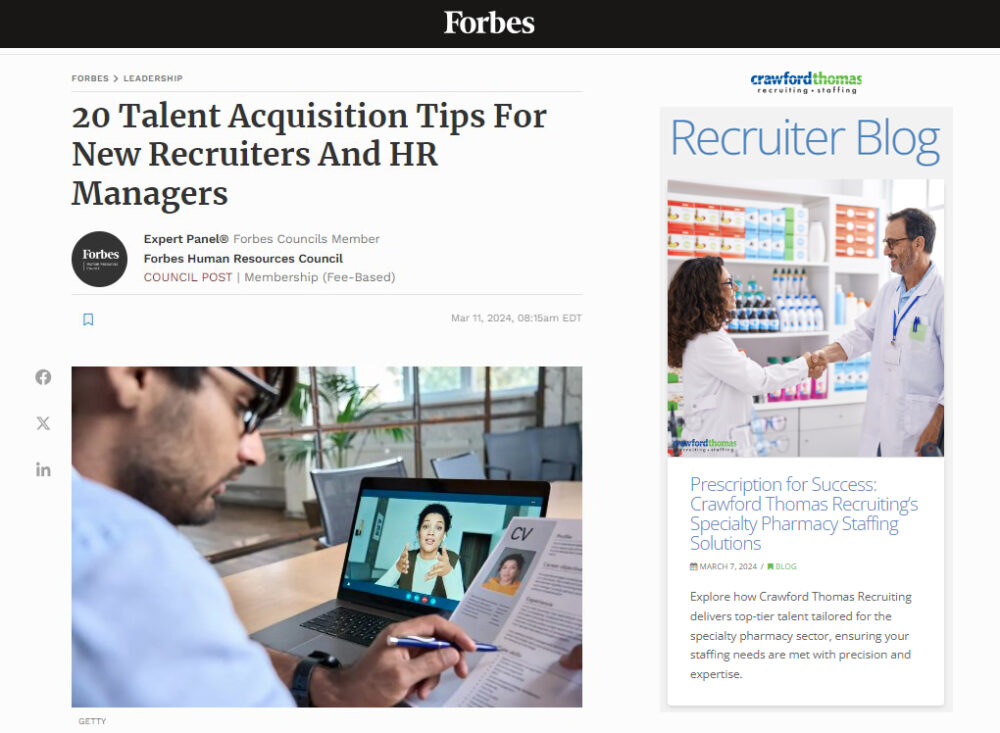In a collaborative effort to empower new recruiters and HR managers, the esteemed members of the Forbes Human Resources Council offer invaluable insights into talent acquisition strategies. Sorting through job candidates can be exhilarating yet daunting, and mastering the art of interviewing and candidate screening is paramount for success in recruitment. Below, the Council shares twenty expert tips aimed at enhancing interviewing and screening skills to identify top-tier talent and foster a robust workforce.
William Stonehouse, President of Crawford Thomas Recruiting, emphasizes the importance of asking behavioral-based questions during the interview process. Rather than relying solely on hypothetical scenarios or theoretical knowledge, behavioral-based questions prompt candidates to recount specific examples from their past experiences. By sharing these anecdotes, candidates provide valuable insights into their problem-solving abilities, decision-making skills, and overall suitability for the job. This approach enables recruiters to assess candidates more effectively, gaining a deeper understanding of their capabilities and potential fit within the organization’s culture and requirements.
Check out Forbes original article here.

- Actively Listen: Pay attention to non-verbal cues and focus on active listening during interviews to identify critical skills and problem-solving abilities (Teedra Bernard).
- Structured Interview Training: Implement structured training to reduce unconscious biases, practice role-playing, and develop effective interviewing techniques (Robert Satterwhite).
- Competency-Based Framework: Incorporate a competency-based framework focusing on real-world examples to evaluate essential skills and adaptability (Karen Perham-Lippman).
- Be Aware of Biases: Constantly question personal biases and avoid seeking confirmation answers during the interview process (Marcela Pizzi).
- Ask Open-Ended Questions: Engage candidates with open-ended questions to encourage insightful conversation and assess their skills (Kathleen Duffy).
- Create a Plan: Outline the purpose of the interview, identify assessment criteria, and decide on evaluation methods to conduct effective interviews (Neil Morelli).
- Use Skills and Behavioral Assessment: Utilize job-customized assessments to predict success, reduce bias, and evaluate communication skills (Eric Friedman).
- Don’t Solely Rely on AI: While AI can streamline the screening process, remember the importance of the human touch in recruitment (Rick Hammell).
- Avoid Textbook Questions: Encourage candidates to share unique insights by asking open-ended questions (Shannon Gabriel).
- Create a List of Must-Haves: Prioritize essential skills over a perfect match to the job description to avoid missing out on top performers (Jenna Hinrichsen).
- Listen and Follow Up: Actively listen and explore unexpected answers to gain deeper insights into candidates (Graham Glass).
- Stay Curious: Engage meaningfully with candidates by asking probing questions and sharing impactful examples (Megan McCann).
- Ask Behavioral-Based Questions: Focus on behavioral-based questions to understand candidates’ past experiences and abilities (William Stonehouse).
- Maintain an Open Mind: Consider candidates for potential future roles based on their skills and expertise (Lynne Marie Finn).
- Evaluate Skills: Focus on evaluating relevant skills rather than prestigious names on resumes (Kshitij Jain).
- Maintain Focus and Structure: Define assessment criteria, prepare relevant questions, and maintain consistency in the interview process (Shiran Danoch).
- Look for Soft Skills: Prioritize cultural fit and soft skills alongside technical abilities for long-term success (Alex Gillespie).
- Find Candidates’ Intrinsic Motivations: Uncover candidates’ motivations to ensure long-term commitment and success (Katrina Jones).
- Implement Behavioral Interviewing: Create behavioral questions and evaluate responses against a rubric for compatible hires (Nakisha Dixon).
- Set Expectations: Communicate clearly with candidates about the hiring process to maintain respect and transparency (Kevin Walters).
By incorporating these strategies into their recruitment process, new recruiters and HR managers can enhance their interviewing and screening skills, leading to more successful hires and a stronger workforce.
As you conclude reading these invaluable talent acquisition strategies, we invite you to explore more industry insights on the Crawford Thomas Recruiting blog page. Delve into a wealth of resources designed to elevate your recruitment practices and stay ahead in the ever-evolving landscape of talent acquisition. Your journey to recruiting excellence starts here.

